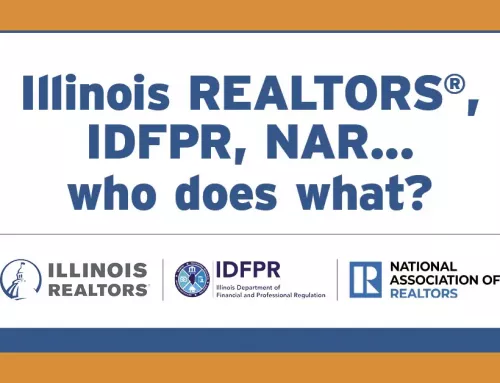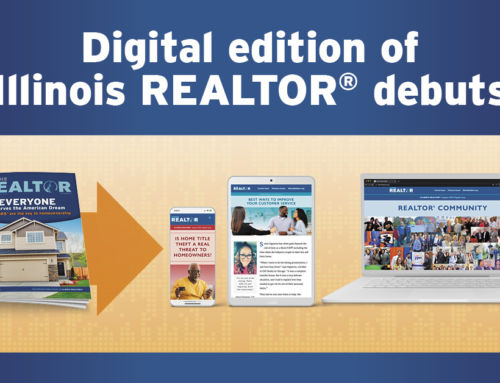Repercussions for violating Just Housing, virtual tour commission questions and collecting rent after a lease expires
What are the potential repercussions to violating the Just Housing Amendment recently passed in Cook County?
The Just Housing Amendment (“JHA”) is a local ordinance in Cook County which went into effect on Dec. 31, 2019. Under the JHA, it is unlawful in Cook County for landlords or property managers to deny housing or change the terms of the rental agreement because of an arrest record, juvenile record, a conviction that has been expunged, sealed, or pardoned or a conviction. (See Section 42-38 of the Cook County Civil Rights Ordinance).
It also affects how landlords advertise their rental listings in Cook County. For example, housing providers may not say “no felons,” “no convicted drug dealers,” “no criminal history,” or “no arrest history” in their advertisements.
Under the JHA, before accepting an application fee, a housing provider must now disclose the following information:
- Tenant selection criteria in writing, which describes how an applicant will be evaluated;
- Applicant’s right to provide evidence demonstrating inaccuracies relevant to conviction history, evidence of rehabilitation, or other mitigating factors; and
- A copy of the Cook County Board of Commission’s procedural rules or the link to commission’s website: bit.ly/Illinois_JustHousing
Once the application fee is accepted, housing providers must follow a two-step process, under which an inquiry into an applicant’s criminal background can only be made after the initial financial and tenant history application criteria is considered.
The process for compliance with the JHA can appear to be both cumbersome and intimidating to landlords and brokers. However, all parties should consider reviewing the new provisions, and consulting with their attorneys about adopting procedures that assure compliance and consistency when screening applicants.
On the surface, the penalties for violating the JHA provisions might not appear significant. The amendment provides for penalties including complainant’s compensatory damages, attorneys’ fees and Commission fines. Although some may consider the threat of Commission fines to be worth the risk of violating the JHA, the compensatory damages and attorneys’ fees could be very significant.
For REALTORS®, there are even more potentially significant repercussions.
The provisions of the JHA are stricter than the Illinois Human Rights Act because it protects applicants with a conviction from having that criteria even being considered in the initial evaluation of an applicant. But, if a violation of the JHA were to be considered a violation of the Illinois Human Rights Act and/or a violation of the Real Estate License Act (RELA) prohibiting illegal discrimination, penalties are potentially severe.
Section 20-50 of RELA specifically prohibits illegal discrimination by licensees and provides for possible suspension of revocation of the offender’s license:
Sec. 20-50. Illegal discrimination. When there has been an adjudication in a civil or criminal proceeding that a licensee has illegally discriminated while engaged in any activity for which a license is required under this Act, the Department, upon the recommendation of the Board as to the extent of the suspension or revocation, shall suspend or revoke the license of that licensee in a timely manner, unless the adjudication is in the appeal process. When there has been an order in an administrative proceeding finding that a licensee has illegally discriminated while engaged in any activity for which a license is required under this Act, the Department, upon recommendation of the Board as to the nature and extent of the discipline, shall take one or more of the disciplinary actions provided for in Section 20-20 of this Act in a timely manner, unless the administrative order is in the appeal process. (Emphasis added).
Additionally, RELA Section 20-20a (31) also prohibits “[e]ngaging in any act that constitutes a violation of any provision of Article 3 of the Illinois Human Rights Act, whether or not a complaint has been filed with or adjudicated by the Human Rights Commission, and provides that a violation could result in a suspension or revocation of a license.
The bottom line is that repercussions for violating the JHA could lead to both significant financial penalties as well as a suspension or loss of your Illinois real estate license.
For more general information about the JHA visit the Illinois REALTORS® web page: bit.ly/IllinoisRealtors_JustHousing
Housing providers seeking to enforce the terms of a lease agreement, including a penalty clause, should consult with their attorneys.
In response to an inquiry from a buyer, I obtained and provided a link to a virtual tour of a home that was on the market. The home could not be shown in person due to the restrictions associated with COVID-19. The buyer viewed the home through the link that I provided and used another REALTOR® to make an offer on the property. I am the REALTOR® who obtained the video link from the listing agent and provided it to the buyer. Am I the procuring cause of the sale of the property and entitled to a commission?
The answer is maybe. However, there is no bright-line rule that helps to determine the procuring cause in the sale of a property when there is an offer of compensation made through the MLS. Initiating a chain of events that leads to the sale of a property, like sending the video link, does not automatically support a claim that a REALTOR® is the procuring cause. This would apply even in these unusual times in which face-to-face interaction may not occur in the showing of a property.
While not verbatim from the National Association of REALTORS® (NAR) “Code of Ethics and Arbitration Manual,” the definition goes something like this: The procuring cause will be the agent who not only originated the chain of events, without abandonment (agent leaving client) or estrangement (client leaving agent), that leads to the successful sale with that buyer. The successful sale is generally defined as one that closes with that buyer.
The Legal Hotline cannot offer any opinion on who might be the procuring cause in a sale because there are too many factors to consider. Many of these claims require settlement among the parties, mediation or arbitration to reach a final conclusion. An arbitration hearing panel would need to consider all the facts and circumstances presented by both sides of the argument and determine who best fits within the definition of procuring cause.
NAR produced a 17-question “Arbitration Worksheet” available at bit.ly/NAR_Ethics_ArbitrationWorksheet that lists pertinent questions for the panel to ask in a hearing. The worksheet features guidance for panel members to consider when deciding who best fits the definition of procuring cause.
Housing providers seeking to enforce the terms of a lease agreement, including a penalty clause, should consult with their attorneys.
I am a property manager and I have tenants who stayed in the property past the end of their lease term. Am I able to collect additional rent for the time period that they held over? The lease has a clause that provides that additional fees may be charged any tenant (three times the monthly rent) that unlawfully remain in the property after the termination or expiration of the lease. Will I be able to collect the additional fees?
On March 20, 2020, the governor issued an Executive Order which included suspending residential evictions until the declared state of disaster ends. The order does not state that landlords or property owners could not collect rent during the state of disaster, or that they could not charge tenants for any hold over period past the term of a lease.
If a tenant stopped paying rent during the pandemic period, they are generally still responsible for meeting the terms of their lease agreement. The landlord or property owner could negotiate a month-to month lease agreement to cover the time period during which it was difficult to move due to the “stay-at-home” order.
However, the question of whether a landlord can invoke any contingency provisions in a contract which penalizes the tenant for holding over during the pandemic require a case-by-case analysis because the final conclusion will depend upon the terms of the lease as well as other specific circumstances.
Under normal circumstances, courts in Illinois strictly interpret contracts and, in the absence of a clear intent to excuse or delay performance under certain circumstances (e.g. pursuant to a force majeure clause) a court would be reluctant to excuse or delay the obligation of a tenant to pay rent.
If the lease contains a force majeure clause that includes an epidemic or pandemic among covered hazards, that may support a tenant’s argument that they could be excused from their contractual obligations from any holding over penalties in the lease.
The term force majeure is understood to encompass acts of nature (e.g. floods or tornadoes), and acts of man (e.g. war). In the context of a legal contract, a force majeure clause addresses circumstances in which contractual performance becomes either impossible or impracticable because of events that could not have been foreseen.
Force majeure clauses generally do not provide for termination of an agreement. However, they may suspend a party’s obligation to perform under the agreement (usually only for the duration of the force majeure event). The language of the specific force majeure provision is the key factor in determining whether the clause will apply in the current pandemic situation.
In some contracts, the provisions may expressly exclude pandemics or global health crises from the application of the force majeure clause, while others expressly include such health events, and others are silent on the issue. Landlords and property managers should review their lease agreements with legal counsel to determine if there is a force majeure clause and how it may impact their ability to enforce the terms of the lease when the declared state of disaster ends.
Even if a lease or other real estate contract does not contain a force majeure clause, there is another legal theory that has been recognized in Illinois which may allow courts to excuse obligations of tenants (or other parties to a real estate contract). That is the “doctrine of commercial frustration.”
The doctrine might be employed to argue that a contract is unenforceable if a party’s performance under the contract is rendered meaningless due to an unforeseen set of circumstances. A party who seeks to excuse performance under the doctrine must satisfy a two-part test: (1) the event that has caused the commercial frustration must not have been reasonably foreseeable; and (2) the value of the parties’ performance must be totally, or nearly totally, destroyed by the intervening event.
In applying the test, a court will consider many factors including whether the purpose of the contract (and any penalty clause for holding over) was destroyed as result of COVID-19.
Housing providers seeking to enforce the terms of a lease agreement, including a penalty clause, should consult with their attorneys.



















